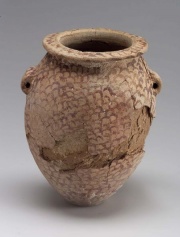Difference between revisions of "Spall"
Jump to navigation
Jump to search
| Line 5: | Line 5: | ||
See also [[exfoliation|exfoliation]], and [[flaking|scaling]]. | See also [[exfoliation|exfoliation]], and [[flaking|scaling]]. | ||
| − | [[File:Spalling_ICOMOS.jpg|thumb|Spalling<br> | + | [[File:Spalling_ICOMOS.jpg|thumb|Spalling<br>Photo credit: J-D Mertz]] |
== Synonyms and Related Terms == | == Synonyms and Related Terms == | ||
| Line 11: | Line 11: | ||
==Resources and Citations== | ==Resources and Citations== | ||
| + | |||
| + | * ICOMOS-ISCS: [http://www.international.icomos.org/publications/monuments_and_sites/15/pdf/Monuments_and_Sites_15_ISCS_Glossary_Stone.pdf Illustrated glossary on stone deterioration patterns] | ||
* Random House, ''Webster's Encyclopedic Unabridged Dictionary of the English Language'', Grammercy Book, New York, 1997 | * Random House, ''Webster's Encyclopedic Unabridged Dictionary of the English Language'', Grammercy Book, New York, 1997 | ||
Latest revision as of 14:19, 2 June 2022
Description
A irregular sized chip or fragment from a ceramic, masonry, stone, or ore surface. Spalling, or breaking up, of the surfaces are often induced by freeze-thaw action, corrosion, or salt formation.
See also Exfoliation, and scaling.
Synonyms and Related Terms
spalling; spaul
Resources and Citations
- ICOMOS-ISCS: Illustrated glossary on stone deterioration patterns
- Random House, Webster's Encyclopedic Unabridged Dictionary of the English Language, Grammercy Book, New York, 1997
- The American Heritage Dictionary or Encarta, via Microsoft Bookshelf 98, Microsoft Corp., 1998
- Richard S. Lewis, Hawley's Condensed Chemical Dictionary, Van Nostrand Reinhold, New York, 10th ed., 1993
- Dictionary of Building Preservation, Ward Bucher, ed., John Wiley & Sons, Inc., New York City, 1996

